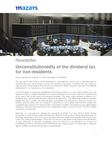
Unconstitutionality of the dividend tax for non-residents
The tax reform (law 1819 of 2016) introduced in Colombia the income tax on dividends paid to residents who are natural persons and to non-residents, regardless of whether they are natural or legal persons. The purpose of this column is to analyze the reasons why the income tax on dividends established for non-residents is unconstitutional.
In the first place, it should be indicated that according to Article 6 of Law 1819 of 2016, as of the taxable year 2017, resident individuals who receive dividends for more than 1,000 UVT's will be taxed at the rate of 10% on the value of the dividend received. This, while, under identical conditions, non-residents who receive dividends will be taxed at the rate of 5%. This differential treatment between people who are in exactly the same situation, and whose only difference is that one of them is a resident and the others are non-residents in Colombia, is not justified and therefore violates the constitutional principle of "non-discrimination" enshrined in multiple international human rights treaties ratified by Colombia (which are part of the constitutional block), as well as Article 13 of the Political Constitution of Colombia.
Secondly, it is necessary to indicate that according to Article 7 of Law 1819 of 2016 "foreign companies or other foreign entities without main domicile in the country" will be taxed with a tax on dividends equivalent to 5% of its value, provided that such profits have already been taxed in the head of the entity that distributes it. Since the income tax on dividends is not levied on the distribution of such dividends to domestic companies, since for these it is considered as an income not constituting income or occasional profit (INCRNGO), the foreign company or entity that is in identical factual conditions is being actively discriminated against.
In conclusion, whoever invests in Colombia through a legal entity will be discriminated because the treatment with respect to dividends will be more burdensome than for whoever invests through a Colombian company. Likewise, the national investor (natural person) who invests in a company will be discriminated against the non-resident, since the latter is rewarded with a 50% reduction in the rate of the tax payable.
Once the equality test has been carried out, it can be concluded, with respect to the two aforementioned assumptions, that there is no objective pursued through the establishment of the unequal treatment, nor validity of such objective in light of the Constitution, nor reasonableness in the unequal treatment, nor proportionality between such treatment and the objective pursued. There is, however, an unjustified discrimination based on the domicile of the legal entity investing in the country and/or the residence of the natural person doing the same, factors of discrimination that are prohibited by the international human rights treaties already referred to, and which are part of the block of constitutionality.
This illegitimate discrimination generates perverse incentives such as, for natural persons, to cease to be Colombian tax residents, and for legal persons to create tax optimization structures that seek solely and exclusively that non-residents may have the same rights and prerogatives as national companies, or to abuse the double taxation treaties signed with Colombia. There is no justification whatsoever for the discriminatory treatment, since the profits have already been taxed by the company that generated them, which is why it makes no difference whether they are paid to a national or foreign legal entity.
There are currently two unconstitutionality lawsuits that directly attack these norms, one of which was filed by the author of this column. Unfortunately, the Constitutional Court -since June 21, 2016- decided to massively suspend the terms to rule on them, in order to be able to dedicate itself to the study of other aspects that it considers a priority.
We hope that such terms can be reactivated soon so that a ruling of unconstitutionality on this and other rules can be known before the end of the fiscal year 2017.


